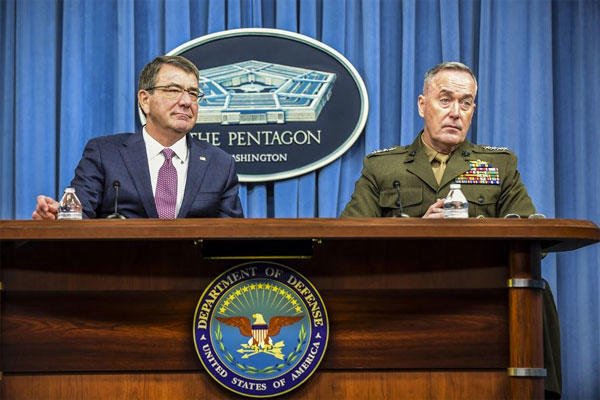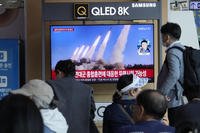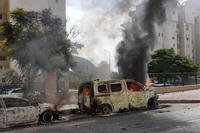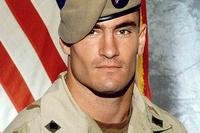U.S. cyber attacks and more frontline assistance from U.S. troops in non-combat roles than was used in Ramadi will be part of the Iraqi offensive to retake Mosul, Joint Chiefs Chairman Gen. Joseph Dunford said Monday.
Although the battle plan was in its formative stages, "the operations against Mosul have already started," Dunford said at a Pentagon news conference with Defense Secretary Ashton Carter. "In other words, you know, we're isolating Mosul even as we speak," Dunford said, and "it is not something that will happen in the deep, deep future."
Dunford said that Iraqi Security Forces (ISF) and their U.S. advisors had moved to a staging area near Makhmour, about 60 miles southeast of Mosul, and U.S. cyber attacks were beginning to disrupt the communications of ISIS commanders in Mosul and their ability to control the militants defending Iraq's second largest city.
Mosul was five times the size of Ramadi in southern Anbar province, which was retaken by the ISF with the backing of U.S. airstrikes, Dunford said, and an offensive to recapture a city of Mosul's size will inevitably require more involvement by U.S. for logistics, supply and bridging operations.
Dunford said the U.S. was likely to "do more in Mosul than Ramadi just because of the order of magnitude of the operation up there in Mosul would indicate to me that we would have more U.S. support in Mosul than we did in Ramadi."
The ISF has already presented its plan for retaking Mosul to Army Lt. Gen. Sean MacFarland, commander of Combined Joint Task Force-Operation Inherent Resolve and the lead U.S. commander in the region for the campaign against ISIS, Dunford said.
Carter said that U.S. cyber attacks on the Islamic State of Iraq and Syria (ISIS) would be a major part of the operation to disrupt the group's "command and control, to cause them to lose confidence in their networks, to overload their network so that they can't function, and do all of these things that will interrupt their ability to command and control forces there, control the population and the economy."
"So this is something that's new in this war," Carter said. In an interview with National Public Radio that aired Sunday, Carter said the cyber attacks were "strikes using cyber essentially as a weapon of war -- just as we drop bombs, there are cyber bombs" that can shut down communications.
At the Pentagon Monday, Carter said "The methods we're using are new" without giving specifics. "Some of them will be surprising" when they eventually become known, Carter said.
In the use of cyber against ISIS, "what we're trying to do and I think what the Secretary was getting at is we're trying to make life difficult for (ISIS), and we're trying to stay step ahead of them," Dunford said.
"So we're trying to force them to make changes. We're trying to make them -- disrupt their communications, and then we can anticipate some of the adaptations they're going to make and be a step ahead of them, and that's -- that's what we're trying to do," Dunford said.
Carter also confirmed for the first time that the so-called "Expeditionary Targeting Force (ETF)" of about 200 U.S. Special Forces troops was on the ground in Iraq and conducting operations.
"The ETF is in position, it is having an effect and operating, and I expect it to be a very effective part of our acceleration campaign" to take back Mosul and Raqaa, the self-proclaimed ISIS capital in northeastern Syria, Carter said.
In January, U.S. defense officials disclosed that about 200 special Operations troops were deploying to Iraq to conduct raids against ISIS leaders and carry out other secret missions, both in Iraq and Syria.
"The only thing I'll say is the ETF is in position, it is having an effect and operating, and I expect it to be a very effective part of our acceleration campaign," Carter said.
In his comments on Mosul, Dunford noted that the mostly-Kurdish Syrian Democratic Forces last week had ousted ISIS from the northeastern Syria border town of Shaddadi, in effect "severing the last major artery between Raqaa and Mosul."
Last week, Marine Lt. Gen. Victor Stewart, head of the Defense Intelligence Agency, told Congress that it was unlikely that the ISF would be able to retake Mosul this year, but Dunford declined to put a time frame on the operation. "Honestly, I don't know," he said.
"There's a lot of unknowns," Dunford said. "My point is that rather than try to project when this is over we ought to focus on setting conditions now to isolate Mosul. I would not at all be in the business of predicting when Mosul would be secure or seized."
ISF generals and Iraqi Prime Minister Haider al-Abadi have repeatedly expressed confidence that Mosul would be retaken this year.
Also last week, Army Maj. Gen. Richard Clarke, commander of Combined Forces Land Component Command-Operation Inherent Resolve in Iraq, said preparations had reached the point where Kurdish forces and the ISF were coordinating on a line of attack into Mosul.
"It's going to be tough to maintain those lines of communication and that logistics effort all the way up there" in the Makmour staging area, Clarke said, "but that's clearly where some of our advising-assisting, some of our logistics support can help them."
In discussing "how the Iraqis may do this" to retake Mosul, Clarke said that the ISF could move out of the Makhmour staging area and "go completely to the Kurdistan region and be right on the footsteps of Mosul. Or they could go up through what you're describing as Baiji up what we call Highway One, almost due north. And what this gives them are multiple options."
-- Richard Sisk can be reached at richard.sisk@military.com






























